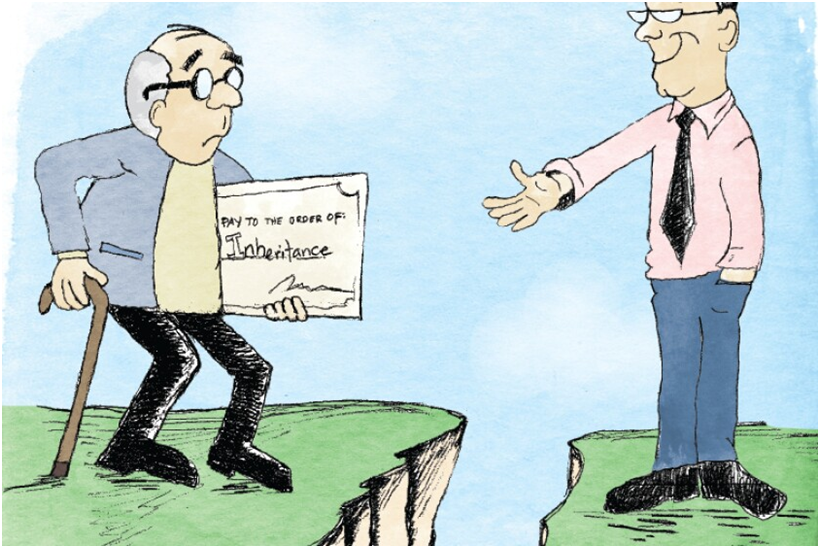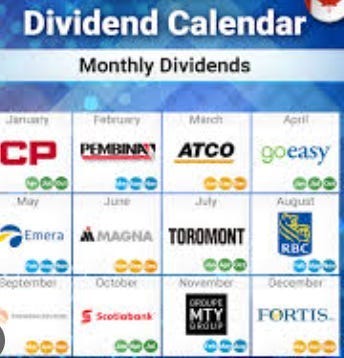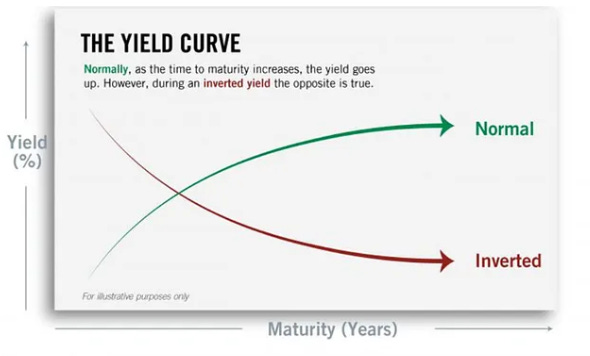Passing the Bucks Won’t Save Millennial’s Retirement
Boomers bailing out Millennial’s retirements: a long shot, at best.
source: Image created by author in Bing Image Creator
Experts say baby boomers will give more than $50 trillion to their heirs. But for many, health care costs will erode that amount and claim the bulk of that wealth.
Baby boomers have enjoyed decades of wealth-building through real estate and the stock market, among other things, but health care costs will drain those resources faster for those who aren't already fabulously wealthy. Even boomers with current accumulated savings of $1 million are at risk of healthcare consuming those assets by the end of their lifetimes.
The assumption is that baby boomers are going to hand over tens of trillions of dollars to their heirs over the next few decades.
The “generational wealth transfer” has become a media fascination for its eye-popping size and because it might help younger generations as they face doubts about their own financial security.
The first 10 annual paid subscribers this week will receive the RODAT Portfolio Income Tracker ($99.99 retail value) which will reveal every RODAT stock in our subscriber portfolio, share counts and dividend amounts. With this digital tool, you may track the portfolio and mirror your own portfolio with the names you find suitable for your needs.
In addition, the first 10 annual paid subscribers this week will receive the digital Stock Market Investing Tool of your choice ($99.99 retail value), many of which are in real time and will greatly enhance your potential for capital gain and dividend income.
Make your complimentary choice here.
That shift is already in the works, and will continue for a couple of decades. According to wealth management firm Cerulli Associates, some $53 trillion will be passed down from boomers to their Gen X, millennial and Gen Z heirs, as well as to charities. That includes both gifts during their lifetimes and inheritances afterward.
But the overwhelming increasing cost of health care for older people means most people in those later generations won’t inherit much, if anything, even if their elders seem well-off today.
The bulk of the trillions will go from one group of already wealthy people to another. Cerulli estimated that 68% of the wealth transferred between 2020 and 2045 — which includes boomers as well as older generations — will come from U.S. households with at least $1 million in investable assets. And only 6.9% of households have that kind of wealth to begin with, Cerulli added.
So, we’re dealing with a relatively small number of households to begin with. Even so, due to escalating health care costs, wealth transfer from one generation to another is at risk and could have dire consequences for retirees twenty or thirty years from now.
That might be obvious, but the notion still raises the prospect of large numbers of people getting a life-changing amount of money, a last gift from a parent or grandparent that meaningfully alters their circumstances. Or not.
Collectively, baby boomers benefited a great deal from America’s economic growth over the second half of the 20th century. The economy boomed in their childhoods as the U.S. became a superpower, and as adults, they had an easier time buying low-cost housing than their children or grandchildren would. Those who bought homes benefited as those properties increased in value. They’ve had the most time to benefit from the U.S. stock market, which has soared roughly 4,000% since 1969.
Falling Behind
Members of the Gen X and millennial cohorts have had to contend with headwinds on multiple fronts. Among them, the explosion in student debt, the rising cost of living, the dot-com bust, the Great Recession, the long but sluggish boom of the 2010s and the Covid-19 pandemic, at more vulnerable stages of their lives and careers.
So those younger generations might feel they could use a leg up. According to a 2023 survey by the Transamerica Center for Retirement Studies, Gen-Xers reported having a median of $82,000 in retirement savings, while millennials reported $49,000 in savings. Even with many working years ahead of them, some have doubts about their ability to retire with financial security.
According to Fidelity’s annual retiree health care cost estimate, a single 65-year-old could need about $157,500 after taxes to cover their health care expenses in retirement, and a couple could need $315,000.
These are just estimates, of course and it’s kind of a wild card as to what the health care expenses are going to be like. It can balloon in the final years of life. Boomers have almost all reached retirement age — though it’s noteworthy that they, too, have concerns about their financial fates. The Transamerica survey found the median baby boomer household reported about $289,000 in retirement savings, short of what Fidelity says a person reaching retirement in 2023 needs.
A lot of Gen-Xers may not get the inheritance they’re expecting to get because their parents encountered ballooning expenses in the later years of life. The less-healthy the end-years of life, the less assets there will be to transfer to the next generation.
Are Your Parents Wealthy Enough to Endure Illness?
The eye-popping figures surrounding the wealth transfer often obscure the reality that health care for the elderly is incredibly expensive and frequently wipes out people’s life savings.
Boomers who are concerned about their own financial fate may be more aware of that fact.
In the non-ultra-rich category, a lot of people hoping that the “wealth transfer” will leave them with a substantial inheritance might end up disappointed, because health care for older people in America is very expensive.
Falling Through the Cracks
“Most people’s retirement savings just don’t cover more than a year or two in assisted living or a nursing home. Our health care is so much more expensive than every other developed country.
In many cases, people spend essentially all of their savings and then finally end up on Medicaid. Single people generally have to be down to their last $2,000 in assets to be eligible.
For all but the very rich, that will probably be taken up by health care costs if you include nursing home care, home and community-based services, assisted living or the more informal caring arrangements that people have. And America is getting much older. That’s going to drive up national health care spending a great deal. By 2050, there are expected to be 84 million people over 65, according to the Bureau of Labor Statistics. That’s almost 50% more seniors than there are today.
This graying of America is working just like this same phenomenon has worked in Japan for the last 30 years. In many respects this accounts for the GDP of that country essentially treading water for most of that time.
This means people caring for aging parents and relatives are going to need more help. And that help is expensive.
Because the baby boom generation is so large and there are fewer kids per baby boomer than there were in the prior generation, the burden of caring for baby boomers falls on a smaller number of people.
Your Takeaway
Though many Millennials and Gen-Xers have been counting upon generational wealth transfer to bail them out of their own retirement savings shortfall, for most of them, this is not a realistic assumption.
Most will have to start saving larger percentages of their earnings and invest in assets that will grow to make up the current shortfall. Otherwise, they will have a less-than-satisfactory retirement to look forward to in their old age.
We have many stocks with strong buy recommendations that you can learn about by upgrading your subscription to Paid today so you can take full advantage of our comprehensive service.
Thanks for reading Retirement: One Dividend at a Time! This post is public so feel free to share it.
Please share your comments with the community by leaving a response.
My Real Time Portfolio Trackers and stock market investment applications to enhance your investing returns and income are available here.
Stock Market Investing Applications
To date, subscribers to my investment newsletter, “Retirement: One Dividend at a Time” who faithfully mirrored our portfolio have attained annual dividend income over $132,000.00.
You are welcome to a free, two-week trial to my investment newsletter, “Retirement: One Dividend at a Time”. Just shoot me an email and request your free trial, at geoschneider1@gmail.com
To receive notice whenever I publish new articles, simply click the follow button at the top of the article next to my name. Better yet, also click the “Subscribe” button and you’ll receive an email notifying you whenever I publish. Thank you.
So glad you can join me here today. Please consider becoming a paid subscriber of my Substack community for the full experience and so we can do even more.
The first 10 annual paid subscribers this week will receive the RODAT Portfolio Income Tracker ($99.99 retail value) which will reveal every RODAT stock in our subscriber portfolio, share counts and dividend amounts. With this digital tool, you may track the portfolio and mirror your own portfolio with the names you find suitable for your needs.
In addition, the first 10 annual paid subscribers this week will receive the digital Stock Market Investing Tool of your choice ($99.99 retail value), many of which are in real time and will greatly enhance your potential for capital gain and dividend income.
Make your complimentary choice here.
For just $5 per month, or $50 annually, you’ll receive full access to every article I write, complete access to my entire archive of articles, access to a special chat group of similarly minded investors and deep-dive articles for paid subscribers only, with recommended dividend growth stocks to supplement your Social Security benefit.
If you found value in this article and would like to support my efforts, please consider buying me a coffee, here.
buymeacoffee.com/georgeschneider
Discover my archive of articles on Substack, here.
Other articles readers have found valuable and actionable reading:
Investing in Realty Income: A Smart Choice for Monthly Dividends
This Perpetual Money Well Never Runs Dry
Are You Feeling Overwhelmed by Your Financial Life?
Potential Recession? Load Up on This Defensive Stock for an 11.5% Yield
Best,
George Schneider
Founder and publisher
Retirement: One Dividend At A Time
Disclaimer: This article is intended to provide information to interested parties. As I have no knowledge of individual investor circumstances, goals, and/or portfolio concentration or diversification, readers are expected to complete their own due diligence before purchasing any stocks mentioned or recommended.
Disclosure: I am long all RODAT Portfolio names. The Portfolio continues to build dividend income with reliable, dependable equities which have long histories of increasing the dividend.
Copyright ©2024, George Schneider










